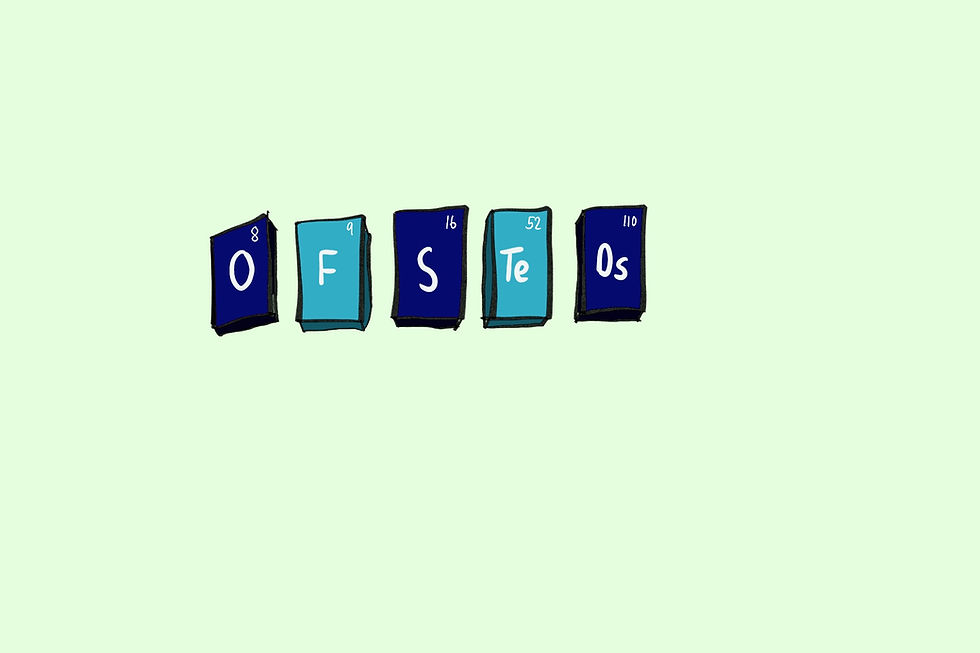A Summary of Ofsted's Science Research Report for Teachers and Leaders
- Marc Hayes
- May 16, 2021
- 6 min read
Updated: Mar 13, 2022

On the 29th April, Ofsted released their report into high-quality science education. It took me quite some time to read (around an hour or so) so I thought I'd write up my notes into a blog in case it's useful to others.
Here is my take on the important parts of the report and how they refer to primary science. The information is organised by how the implications relate to teachers and school leadership.
The Importance of Early Years and the EYFS
1️⃣ This is the first formal year of science education.
👩🏼🏫 Children should be exposed to myriad vocabulary and phenomena which build a general science knowledge.
📖 Teachers should use picture books to teach and discuss important vocabulary that will enable success in Year 1 and later.
🌺Learning science in EYFS should not be understood as only preparing children for Year 1.
What teachers need to know:
🧩 Learning in science is most effective when the curriculum is organised into bitesize chunks (think Rosenshine). These chunks should enable children to focus on an appropriate component of knowledge that builds on prior learning and prepares for conceptual development.
🧠 How much new learning there is in a lesson is important as pupils are limited by the cognitive load placed on them. Science is already a difficult subject to learn and so reducing extraneous cognitive load (distractions, additional things to consider, number of things to focus on) is really important if we want children to learn the object of the lesson.
🥼 Working scientifically shouldn't be viewed as merely teaching skills. Rather, there is a body of knowledge detailing the what, when, where, how, who and why of working scientifically that is important to teach. This is referred to as disciplinary knowledge and should be taught in tandem with substantive knowledge: the core facts and concepts of the curriculum.
🧬 It is important to identify the best opportunities to teach disciplinary knowledge alongside substantive knowledge. Even when topics, such as evolution, do not have any obvious links to working scientifically: Ofsted give as an example, the teaching of how Darwin came to theorise evolution rather than leaving children open to interpreting that it was just a 'good' guess.
⚔️ Science is hard for pupils to learn because a lot of science contradicts the observations we make in every day life. This means that misconceptions are rife and can be enforceable. Only when pupils develop a strong understanding can some misconceptions be ready to address. The order that we teach things in therefore becomes very important.
⛓ Pupils do not transfer their knowledge of working scientifically easily from one context to another. It is important to consider the needs of the pupils at all stages, and to model the key parts of their learning, regardless of their previous experiences. For example, learning to classify leaves draws on a different knowledge base that classifying vertebrates.
😄 Practical work is often enjoyable for pupils, but this is not a reason in itself for it to be used. Instead, practical work should be used purposefully to either draw attention to a component of substantive or disciplinary science, or as a curriculum goal in itself, such as conducting an enquiry. Practical work should also be used once children's understanding has been developed, rather than as a means to provide for 'discovery' learning.
👩🏾🔬 Teacher demonstration is also an equally valuable tool, and can actually be more effective due to the way it can increase working memory capacity for children. As they don't have to worry with handling multiple components, they can address their full attention on the idea being demonstrated.
💬 A key part of effective teaching is the quality of our explanations. Pupils rate this as the number one factor in helping them learn.
📖 There is a positive relationship between reading achievement and science achievement. Development in one supports development in the other.
👩🏼🏫 The most effective teaching includes explanation, questioning modelling and feedback that is responsive to the needs of the children.
🎣 Enquiry-based learning - which is different to the scientific enquiries which the National Curriculum stipulates children learn - has variable outcomes in its effectiveness. Ofsted suggest that teacher-directed instruction can lead to higher quality learning. This is mainly due to the amount of cognitive load induced and amount of scaffolding that enquiry-based learning relies upon.
📝 Retrieval practice is an important part of science in that time should be given to consolidate prior learning. Retrieval practice works best when feedback is given immediately afterwards. Pupils should practise retrieval over extended periods of time. Partial retrieval practice, such as identifying missing letters in a word, has been shown to be very effective.
🧱The most important part of effective retrieval practice is that it encourages pupils to remember their learning in a way which supports their understanding of the concept. I've understood this to mean practising retrieval of the fundamental facts and relationships of a topic. For example, when recalling their learning about evolution, it is not that important for children to remember that Darwin sailed on The Beagle, as much as it is to remember that Darwin's ideas were not initially accepted.
What leaders need to know:
🧬 The sequencing of the curriculum is incredibly important, and time needs to be appropriately attributed to each of the components existing in the curriculum. An ad-hoc approach to topics does not support learning in a way that careful planning and sequencing can achieve.
📖 High-quality textbooks can support the content being taught in the curriculum, as online content can sometimes be out of sync with the intention of the curriculum, and can suffer some of the inaccuracies which prevent high quality learning from occuring.
👨🏻🏫 Teachers' content knowledge is an issue in the primary sector. Only 1 in 20 primary teachers have a science specialism beyond A-level, and in some cases, primary teachers share the same misconceptions that pupils are likely to obtain; sometimes, these misconceptions are actually taught to the children.
🧠 The quality of teacher explanations is affected by their own content knowledge. Investing in teachers' content knowledge can enable teaching to become more effective as teachers will be more able to respond to pupils' needs.
👨🏿🔬Ofsted recommend having a science specialist in the school to support with curriculum implementation. They also emphasise the importance of subject-specific CPD for primary teachers so they have a stronger understanding of the concepts and pedagogy of primary science.
⌛️ There is a recommendation that science leaders have dedicated leadership time. This will of course depend on the responsibilities and scope of the role in each school.
My Own Take
I feel that I'm in a fortunate position in that most of the report (admittedly, it did take some time to read) resonated with me in a positive way. I really like the the way the report refers to retrieval practice - the need for time to consolidate - and ensuring that working memory isn't overloaded. For me, this shows that the idiosyncrasies of science education have been considered with strong research about how people best learn.
One of the main criticisms of the report that I have seen on Twitter has been based on the idea that primary teachers need to be specialists. Personally, I feel I have a reasonable understanding of science based on my own degree (BA in Primary Education where science was a core module for three years) and my own developing understanding of science since qualifying. I don't claim to have a knowledge strong enough to attempt degree-level science, but I do feel that I have sufficient understanding to teach primary science.

I think high-quality texts can be the perfect starting points to develop subject knowledge for primary science. There is a growing wealth of accessible texts written by experts that can be used as authentic sources of knowledge. For example, reading Sabina Radeva's 'On The Origin Of Species' book is a brilliant way of introducing all the Evolution objectives from the National Curriculum.

Last year, I put together all of the ideas in the science curriculum and organised them all in 'components'. I might need to go back and edit some of them, but for each objective I've also included ideas for 'working scientifically'. Hopefully this might be a good starting point for some people who are unable to access resources or CPD which they might otherwise require. Click here to go to my Primary Science Notion Page.
Just for context, I am a primary Assistant Headteacher with responsibility for the whole curriculum. My school's approach has been to be quite prescriptive in how we deliver the curriculum, and we have aimed for an 80:20 ratio of prescription to flexibility. The reason for this is so that we can direct the vast majority of teachers' approach to the curriculum so that it can fit with best practice identified by research. We can also easily evaluate the content and provision in each year group so that we have confidence in the accuracy, breadth and depth of what is being taught.
Although this might not appeal to all teachers, we have found that it has reduced a lot of anxiety and worry over what teachers need to include in the curriculum, and it frees them up to be inventive and creative in how the content can be matched with the needs of their class. Our approach means that system-level changes can be made reasonably easily, such as with curriculum sequencing, and I think it's important to acknowledge that this reduces some of the issues that some teachers might face if their curriculum is organised in a less prescribed format.

If you'd like to support the work I do on this blog, you can click on the link below.
Click here to download the graphic in PDF format.




Hi Marc,
Really useful summary of the document.
You say that 'High-quality textbooks can support the content being taught in the curriculum, as online content can sometimes be out of sync with the intention of the curriculum, and can suffer some of the inaccuracies which prevent high quality learning from occuring.'
Are there any examples of this sort of textbook for primary age children? Is it something that usually comes as part of a scheme? Not asking you to endorse any one particular product but would like to be able to evaluate a range of resources to help with delivery.
Simon